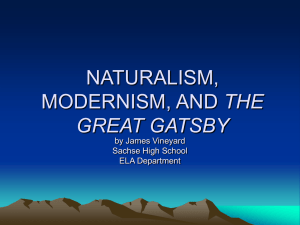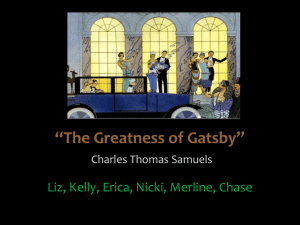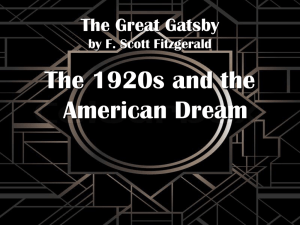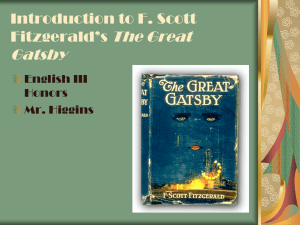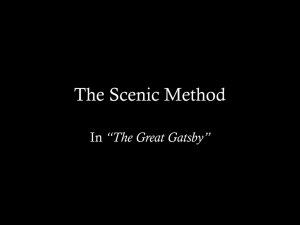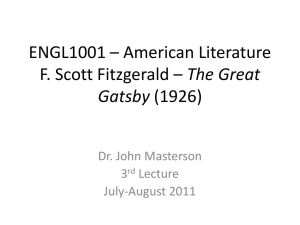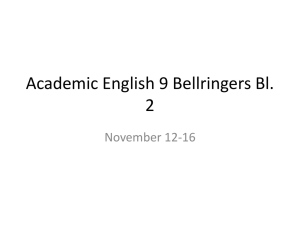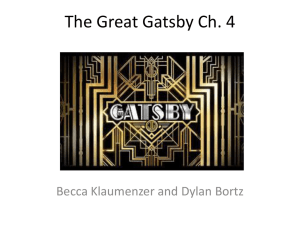The Great gatsby
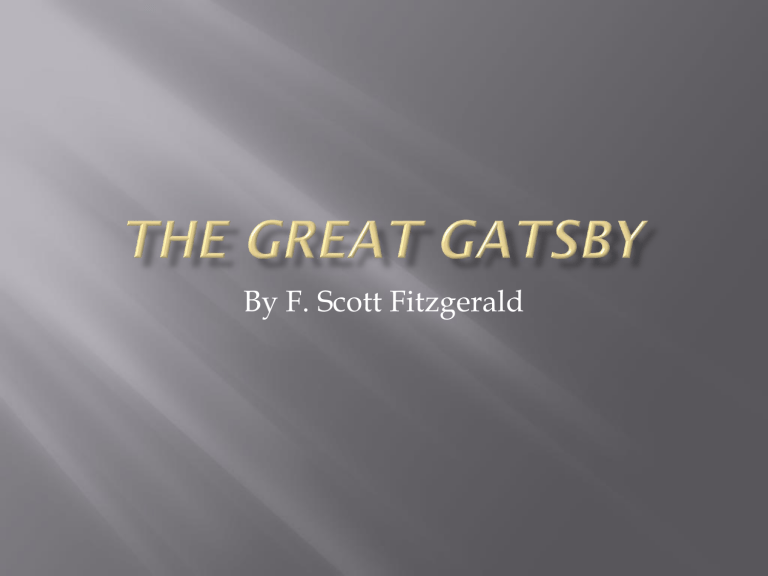
By F. Scott Fitzgerald
Francis Scott Key Fitzgerald
Born in 1896, St. Paul,
Minnesota
Named after famous, second cousin Francis Scott Key
Attended Newman School (New Jersey) from
1911–1912
Enrolled at Princeton University in 1913 as a member of the Class of 1917
Joined Princeton Triangle Club, a musical comedy club, and begins writing (leads to his original submission to Charles Scribner and
Sons)
Fitzgerald left Princeton to enlist in the US
Army during World War I (war ended)
Zelda Sayre (1900–1948,
“Golden girl“ of Montgomery youth society
Engaged in 1919, moved to New York City
Couldn’t convince Zelda that he would be able to support her, leading her to break off the engagement.
This Side of Paradise is accepted by Scribner's in
1919, and Zelda and Scott resumed their engagement.
The novel was published on March 26, 1920, and became one of the most popular books of the year.
Zelda experienced many mental health issues
(schizophrenia)
Due to her constant medical treatment,
Fitzgerald always had to take out loans to support his family (only his first book made enough to support his lifestyle)
Only finished four novels
This Side of Paradise (1920)
The Beautiful and the Damned (1922)
The Great Gatsby (1925)
Tender is the Night (1934)
Wrote many short stories about youth and promise combined with old age and despair
Only wrote short stories to subsidize his bills and lifestyle
Also wrote for Hollywood (“hack”)
Estranged from wife who lived in east coast mental institutions
Lived with his mistress in Hollywood
Suffered two heart attacks and was hospitalized
Suffered one more fatal heart attack in 1940
Young, literary modernists filled with
“disillusionment”
Moved to Paris after first World War
Included Ernest Hemingway, F. Scott
Fitzgerald, Ezra Pound, Sherwood Anderson,
Waldo Peirce, John Dos Passos, John Steinbeck,
Erich Maria Remarque and Cole Porter.
Term was credited to author Gertrude Stein
Term coined by Fitzgerald
Named after music of the time
Between WW1 and the Great Depression
Traditional values declined
Stock market soared for a brief time
Period of young people being carefree
Fitzgerald criticized the “relaxed” time period in his works
1925
Set on Long Island, NY
Prohibition (bootleggers)
Organized crime
Not popular at first
Commented on materialism andlack of morality of the time
Modern Library’s 100 best books of the 20 th century
The cover of The Great
Gatsby is among the most celebrated pieces of jacket art in American literature.
Francis Cugat was commissioned to illustrate the book while Fitzgerald was in the midst of writing it.
Completed before the novel
Fitzgerald told his publisher he had "written it into" the novel.
Recall one fact from the video about each of the following:
The 1920s
F. Scott Fitzgerald
The Great Gatsby
Students will be able to recall important facts regarding Fitzgerald, The Great Gatsby, and the Jazz Age (1.7.11.A)
Agenda:
1. Bellringer
2. PowerPoint Presentation
Assignment: Read chapter 1 of The Great Gatsby
Who is Nick Carraway? How does he know
Daisy and Tom? What do we know about
Gatsby at this point?
Students will be able to describe characters in chapter one of The Great Gatsby (1.3.11.A)
Agenda:
Bellringer
Discussion
Assignment: Read chapter two of Gatsby
In one paragraph, do your best to describe the plot in chapter two. Summarize what you read, and then write a few sentence reaction to the chapter.
Students will be able to define modernism
(1.3.11.B)
Agenda:
Bellringer
Discussion
PowerPoint on Modernism
Assignment: Read chapter three of Gatsby by
Thursday
Organize your binder.
Remove all short reading activities from beginning of year
Remove all in class activities/worksheets
Keep all study guides, unit organizers, bell ringers, vocabulary sheets, tests, and grammar sheets
Keep all scantron sheets
Keep your Huck Finn writing assignment
Get your Lost Lady bell ringers together
Students will predict how Jay Gatsby makes his millions by creating tableaus (1.3.11.A)
Agenda:
Bellringer (binder)
PowerPoint
Assignment Sheet
Group work
Assignment: Read chapter three for tomorrow
Get into your groups (four people) and determine what your prediction will be.
Students will predict how Jay Gatsby makes his millions by creating tableaus (1.3.11.A)
Agenda:
Bellringer (groups)
Group work
Presentations
Assignment: Read chapter three of The Great Gatsby for tomorrow
Students will be able to recall important information from the text (1.3.11.A)
Agenda:
1. Bellringer
2. Discuss
3. Read
Assignment: Read chapter 4 of Gatsby for homework
Students will be able to recall important information from the text (1.3.11.A)
Agenda:
1. Bellringer
2. Discuss
3. Read
Assignment: Read chapter 6 of Gatsby for homework
Students will be able to demonstrate an understanding of the text (1.3.11.A)
Agenda:
1. Bellringer (review PowerPoint notes)
2. Quiz
3. Discuss reading
Assignment: Read chapter 7 of Gatsby
Students will be able to demonstrate an understanding of the text (1.3.11.A)
Agenda:
1. Bellringer
2. Discuss reading
Assignment: Read chapter 9 of Gatsby
Students will be able to demonstrate an understanding of the text (1.3.11.A)
Agenda:
1. Bellringer
2. Discuss reading
Assignment: Read chapter 9 of Gatsby

